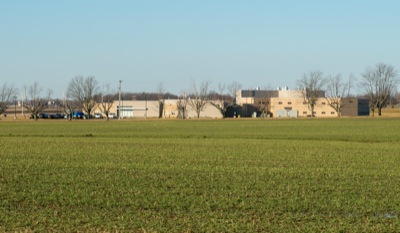Wednesday, February 3rd, 2016
County considers solar energy project
By William Kincaid

Photo by Mark Pummell/The Daily Standard
Mercer County Commissioners are considering a solar project that would power five facilities on state Route 29 and Mud Pike. It likely would be built somewhere on a 68-acre parcel of county land - currently leased out for farming - located east of the county home and jail.
CELINA - Mercer County Commissioners are considering committing to a solar project to power five county facilities on state Route 29 and Mud Pike.
If approved, a developer would pay to construct and maintain a solar field on county-owned land, according to Palmer Energy Co. representatives Bob Snavely and Melissa Webne, who addressed commissioners on Tuesday afternoon. They represent the County Commissioners Association of Ohio Service Corp.
"The idea is that there is no upfront cost because the developer comes in, installs the array and the county essentially purchases the electricity it produces like you would with your electricity supplier," Webne said.
If commissioners commit, the county must make a refundable $5,000 deposit and agree to purchase power for 20 years.
The county could save as much as 8 percent a year on electricity for the five facilities through the project, though a specific dollar amount was not available from the representatives on Tuesday.
"The big savings here, I think, is the effect the solar has on your peak load capacity ... bringing your price down, making you more attractive to suppliers for pricing in the future; that's the big component here," Snavely said.
The company recommends installing one solar array to serve the county jail, board of development disabilities adult education facility and Cheryl Ann School, county engineer office and county home.
"The combined array would produce 819,000 to 902,000 (kilowatt-hours) per year and provide estimated savings of approximately 8 percent on the average, collective electric costs at these facilities," according to the proposal.
The array would be built on 68 acres of county-owned land - currently leased for farming - located east of the county home and jail. The solar array would require 4 to 5 acres. The developer would choose the exact location.
"The array itself will be tied into the actual meters at these facilities," Webne said.
The representatives did not know how many solar panels would be installed. When the field is not producing electricity, the county would use its regular power provider, Webne noted.
Organizers are trying to get as many counties as possible on board to lower project costs when a request for a proposal is sent out next month. They're asking commissioners to decide by March 1.
"The goal is to group as many of those counties together as we can and put that out to the local, regional and national developers," Webne said.
"Some have the land and are lucky enough to be able to do this and other counties do not, and that's a huge piece of it," Snavely added, noting 25 counties have expressed interest.
The developer will be eligible for a 30 percent federal investment tax credit, which was recently extended another five years.
Commissioners on Tuesday neither supported nor opposed the project. Commissioner Jerry Laffin said he would like to look at Celina's solar agreement.
The city has a power purchase agreement with SolarVision of Westerville. SolarVision paid the city $1.3 million to set up the plant on 30 acres of city land along Meyer Road. In return, the city must buy its output. The city used some of the funds to purchase the land off Meyer Road. The solar field, containing more than 21,000 panels, produces roughly 2 to 3 percent of the city's total power. The plant has an annual benchmark of 6,200 megawatt hours.
Commissioner Greg Homan would like to know how much money the project would save the county.
More accurate figures would be provided once a developer is selected, Webne pointed out.
Clerk/administrator Kim Everman said $74,000 was appropriated last year for the jail's electricity. Palmer Energy believes it can shave 8 percent off that total.
Commissioners would be asked to sign a 20-year power purchase agreement. It could be renegotiated at the 10-year mark and commissioners would have the option to purchase the solar array at 20 years, Webne said.
Homan asked if the county could request the solar array be taken down by the developer after 20 years.
Officials would need to negotiate a clause to that effect, Webne said.
"It's not unheard of," she said.

